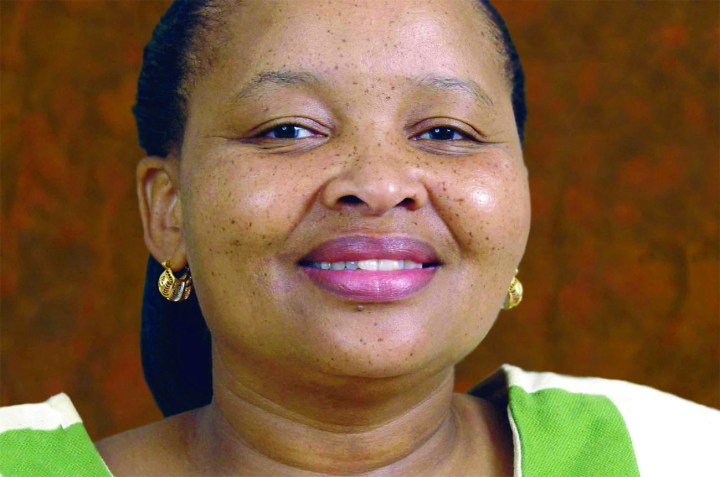On Monday July 5, Arts and Culture minister Lulu Xingwana will officially open moral regeneration month at a gathering in Mafikeng. Which reminds us to ask a perennial question: when will the Moral Regeneration Movement finally cut its losses and disband?
In the opening to his talk at the 2007 New Yorker Conference, social and cultural psychologist Jonathan Haidt asked the audience to raise their hands to indicate whether they were liberal, centrist or conservative. Most of the hands that went up were liberal, which was no big surprise, given that the room was by definition filled with New Yorker readers. Haidt then suggested that these people might want to beware: their partisan feelings, he said, blinded them to moral and political reality.
Assuming there are no liberals that admit to the label left in the country, what does this have to do with South Africa’s Moral Regeneration Movement, which has its roots in a meeting between Nelson Mandela and religious leaders in 1997? A lot, it seems, because according to Haidt while liberals live in an “atom world” where individuals can do what they want as long as they don’t harm or cheat anyone, most of the planet lives in a “lattice world” where morality exists to protect the integrity of the group. The MRM, established as it was by an ANC government that believes (or says it believes) in group values, falls into the “most of the planet” category.
This month (it comes around so quickly) is once again moral regeneration month in South Africa. The 2010 theme is “Together reclaiming our humanity through the Charter of Positive Values,” and while it’s difficult to get past the dead language in the brochure-ware and the charter itself, it’s even more difficult to fault the objectives – corruption, rape, child abuse, murder, domestic violence, greed and nepotism are amongst the chief social and political ills that the MRM was set up to eradicate through the power of ubuntu and community participation.
Sadly, the movement (it refuses to call itself an organisation, which may be part of the problem) has been spectacularly unsuccessful. In an article by Nawaal Dreyer in Business Report in March this year, it was reported that the MRM had almost nothing to show for the R22-million that government had sunk into it up until that point. Wrote Dreyer: “Parliament’s Arts and Culture portfolio committee heard on Wednesday that in the body’s seven years of existence, its books had never been audited and that even the Department of Arts and Culture – which is meant to oversee the initiative – is not sure what impact it has had on moral issues in South Africa.”
The MRM’s board and CEO were not present to answer the committee’s questions, which didn’t make the MPs happy, but what they found out from officials of the DAC was that the movement had adopted their charter in 2008 and decided, in 2009, to choose the month of July as their official marketing month.
What else had they been doing? Well, there was a moral regeneration conference in Gauteng in 2009, and while there was no risk audit committee or proper remuneration scheme for employees – an oversight that placed them at odds with accepted corporate governance requirements – an audit of the books (the first ever) was being undertaken by PriceWaterhouse Cooper. Oh yes, and a study had also been commissioned to see if any of the initiatives were working.
Now this, which arrived in The Daily Maverick’s in-box on July 1: the “opening of moral regeneration month” press release from the communications unit in the presidency.
The official launch is on Monday July 5, when Arts and Culture minister Lulu Xingwana will address a gathering “attended by some 1500 people from all walks of life.” If the remaining contents of the press release are anything to go by, it’s bound to be a perplexing affair.
Because on the surface, irrespective of what happened in parliament a few months ago, it would seem that the MRM retains a positive view of its own efficacy: “Initiated as a Section 21 Company, the Moral Regeneration Movement is a civil society driven networking platform mandated to facilitate, encourage and coordinate programmes in society that work towards restoring the moral fibre of South Africa. Over the past seven years it has mobilised communities and created networking forums within civil society, the three tiers of government, labour, faith-based organisations, some Chapter 9 institutions, youth formations and political parties.”
Give that a second reading, though, and it becomes clear that the MRM isn’t so sure of itself. The lack of statistics and the use of verbs like “facilitate” and “mobilise” speak of an entity that’s grasping for some way to justify its existence.
What it’s also had to contend with, of course, is the issue known as Jacob Zuma. It was Zuma who took the mantle from Mandela and drove the MRM’s establishment in 2002, and lately the current president hasn’t been covering the movement in glory.
Unless, that is, you believe in the words of HL Mencken: immorality is the morality of those who are having a better time.
By Kevin Bloom
Read more: Business Report, MRM’s Charter of Positive Values
Photo: Arts and Culture minister Lulu Xingwana
















 Become an Insider
Become an Insider